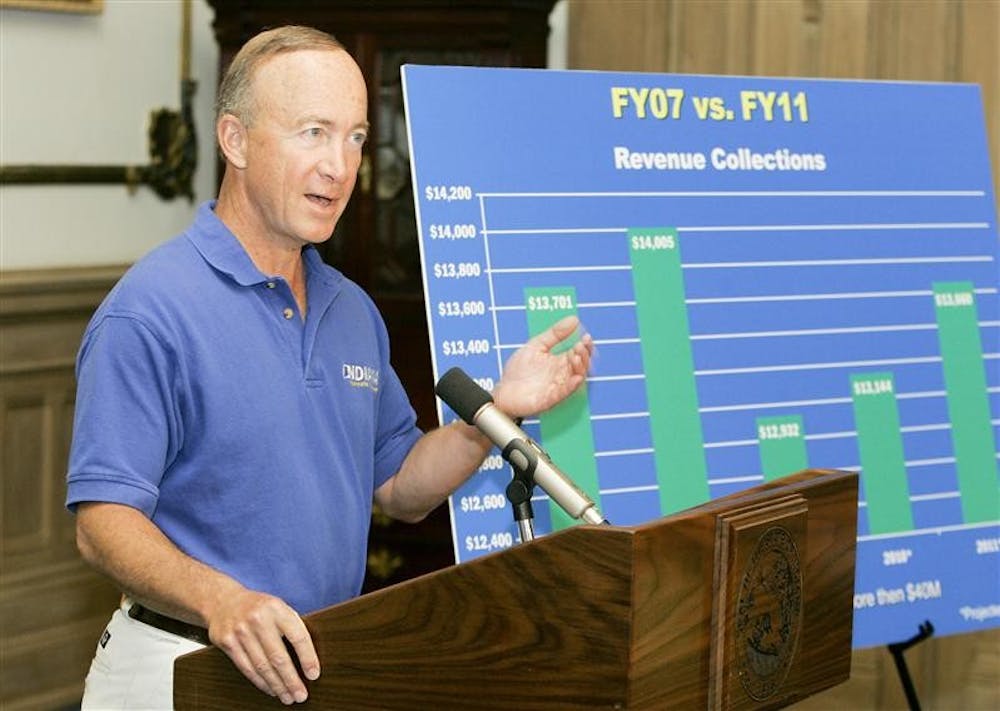INDIANAPOLIS – The Indiana General Assembly passed a two-year state budget Tuesday, narrowly avoiding a large-scale state government shutdown that would have begun just after midnight.
The Democrat-led House voted 62-37 for the $28.7 billion budget late Tuesday afternoon, and the Republican-ruled Senate passed it 34-16 about two hours later. The bill was quickly signed into law by Republican Gov. Mitch Daniels.
“Like any compromise, this budget has its defects,” Daniels said in a statement moments after the Senate passed the bill. “But it meets the fundamental condition I laid down in January and every day since: to limit total spending enough to preserve our surplus and thereby protect taxpayers against the tax increases happening in
virtually every other state.”
Daniels had warned lawmakers and the public that besides essential services such as state police and prisons, most of state government would shutdown beginning at 12:01 a.m. Wednesday if a new budget or stopgap funding measure was not in place.
It was the closest lawmakers had come to such a deadline since 1993, when they also passed a budget on June 30 – the last day of the fiscal year – by overriding a veto by then-Gov. Evan Bayh.
“We’ve done it yet again,” said Senate President Pro Tem David Long, R-Fort Wayne. “Let’s pray that times get better and the next time we have a budget, we’ll have a little bit more to deal with, better times to talk about.”
The General Assembly did not pass a budget by a regular session deadline of April 29, forcing a special session that began June 11.
The bill would increase overall spending on public schools by 1.1 percent in the first year and 0.3 percent the second. It would keep operating spending for public colleges and universities essentially flat, but provide more than $600 million in bonding authority for higher education building projects.
Total state funding for all eight IU campuses was cut by 4.5 percent for fiscal year 2010 and by 1.5 percent for fiscal year 2011. A one-time allocation from the American Recovery and Reinvestment Act makes up the difference from the state budget cuts, so total IU funding will remain consistent at about $600 million. The state and federal funding represents about 23 percent of IU’s overall $2.7 billion budget.
The bill would leave a projected surplus of $1 billion at the end of two years, which Daniels said was needed as a cushion against a lingering or new economic downturn.
The votes followed impassioned debate in both chambers, with many Democrats blasting the plan because it would result in spending cuts to numerous rural and urban school districts with declining enrollments.
They also said there was a growing resentment against Indianapolis, because the budget included money for the city’s struggling sports agency but did not steer help to projects that some Democrats wanted in their districts.
“What about Gary, Indiana? Stop treating it as a stepchild, as a reject of the state,” Democratic Rep. Vernon Smith said of his home city near Chicago. “I came to tell Indianapolis that you are not the center of the world. I love Gary, and Gary counts.”
House Minority Leader Brian Bosma and other Republicans said a budget bill passed previously by House Democrats would spend too much, erode the state’s surplus and force drastic cuts in services or a tax increase.
“I can tell you who the biggest winner is in Indiana, and that is the taxpayers because
legislators were willing to swallow difficult medicine,” said Bosma, R-Indianapolis. “We have to be frugal when times are tough.”
Republican leaders noted that state tax collections have plummeted in recent months, and a revenue forecast issued in May predicted the state would take in about $1.1 billion less through June 2011 than predicted in April.
“I’m going to ask you to vote yes even though you hate this budget,” said Senate Appropriations Chairman Luke Kenley, R-Noblesville. “This budget passed by the General Assembly is better than no budget.”
House Speaker Patrick Bauer, D-South Bend, said Democrats had done all they could to at least secure larger overall spending increases for schools than was included in a budget bill previously passed by Senate Republicans.
In the House, 14 Democrats joined all 48 Republicans in voting for the budget. Thirty-seven Democrats voted against it. In the Senate, 30 Republicans and four Democrats voted yes, and three Republicans and 13 Democrats voted no.
GA passes 2-year state budget

Get stories like this in your inbox
Subscribe





